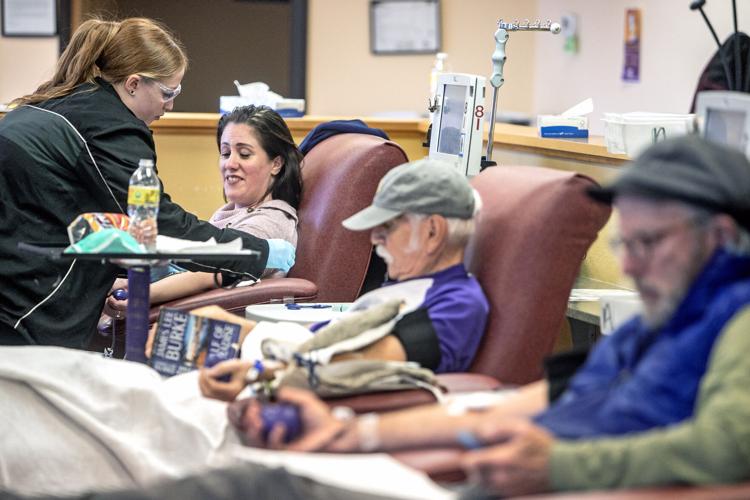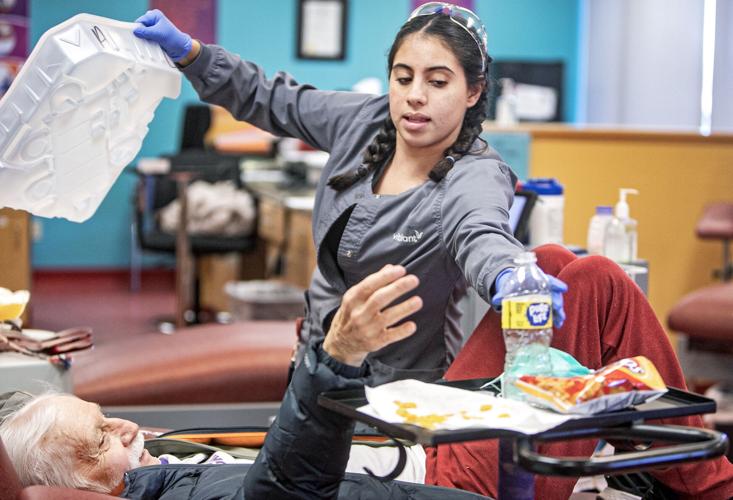While a clinic employee prepared to jab a needle in his arm, Peter Warner talked about his harrowing first experience giving blood.
He was 17 and his father had suffered a chain saw accident that nearly cut off his arm.
Fortunately, his father had the rare AB-positive blood that allowed him to take any blood type, so Warner quickly donated his — which was critical at a rural medical clinic with limited resources.
Now 59, Warner said his donation earlier this week at the Vitalant clinic in Santa Fe marked his 340th time giving blood. His father’s accident turned him into a lifelong donor.
“I sort of came to the realization, ‘Hey this is important,’ ” Warner said.
Vitalant, a nonprofit blood collector based in Arizona, is hoping to bring in more dedicated donors like Warner to remedy a persistent national shortage. In particular, the supply of critical type O-negative has fallen to an emergency low.
Those with O-negative blood are known as universal donors because anyone can receive their red cells. For that reason, it is used in medical emergencies when there’s no time to test a patient’s blood type.
Vitalant is running at a two-day supply of this blood, well below the four-day threshold considered critically low, said Evelyn Rosado, spokeswoman for Vitalant in Albuquerque.
“It’s far beyond critical — now it’s an emergency,” Rosado said. “A week’s supply is really what we look for, at least.”
Another much-sought blood type is O-positive, which is used the most in transfusions, she said. Vitalant also encourages people to donate platelets because they aid cancer patients and must be used in a week, she added.
Donations of every blood type are encouraged to help the 900 hospitals Vitalant supplies nationwide to keep their shelves stocked, Rosado said.
It’s a different situation from a year ago when the coronavirus’ omicron variant raged through the country, keeping infected people from donating blood for 28 days and making others wary about being poked with needles at clinics.
The shortage prompted the American Red Cross to declare a national blood crisis.
It came when demand for surgeries and other medical treatments spiked after patients were forced to forgo them due to emergency COVID-19 care taking priority.
A few of the same factors are having an effect, such as the normal slowdown during the holidays, and winter storms and illnesses keeping people from clinics, Rosado said.
One lingering impact from the pandemic is many people continuing to telework, resulting in a 50 percent drop in blood collected at business-hosted drives since 2019, she said. Through much of the pandemic, students did remote learning at home, leading to far fewer school-based blood drives, she said.
The lack of blood drives caused a decline of 90,000 donations nationally, she said.
“It has not subsided,” Rosado said. “This is not a problem that is going to be fixed overnight, or even in a month. It’s going to take some time to remedy.”
So what’s the long-term solution?
“We really need for people to get out there and donate a little bit more consistently,” Rosado said.
If eligible people would donate at least three times a year, it would go a long way in shoring up supply and preventing future shortages, Rosado said. Then Vitalant wouldn’t have to ask people to come in, she said, referring to the group emailing invitations to previous blood donors.
In an email, John Adams, chief executive at Presbyterian Santa Fe Medical Center, said the hospital hasn’t seen an impact yet to its blood inventory.
That could change, he added.
“Vitalant does an excellent job with our blood supply but they are dependent on donors to maintain that supply,” Adams wrote. “When they have concerns about supply decreasing, it is only a matter of time until that reaches hospitals and EMS.”
The hospital is hosting a Vitalant blood drive next week, Adams wrote.
At the clinic, Lois Tucker, 72, said last year she began giving blood as often as she could after a long break in regular donations.
Tucker has AB-positive blood, the same rare type as Warner’s father. For that reason, she donates platelets to help cancer patients.
“Which is best what they can use my blood type for,” Tucker said.
Although COVID-19 has let up since a year ago, the coronavirus combined, with the flu and RSV — respiratory syncytial virus — has decreased blood donations in recent months, said Consuelo Chavez Lucero, the clinic’s team leader.
Overall, the clinic has its slow days and busy days, Chavez Lucero said, adding the clinic’s donations are slowly creeping back up to where they were before the pandemic.
“But it’s still not enough to keep us where we need to be,” she said.
To bolster O-negative blood collection, they go for the “power red donation” whenever possible, she said. The process extracts roughly double the red cells by drawing two pints of blood instead of one and returning the plasma and platelets to the donor’s body.
However, this type of donation requires a certain height and weight and some people don’t qualify, Chavez Lucero added.
Carol James, another Santa Fe donor, was rejected the last time she tried to donate blood because her hemoglobin was too low. This time, after boosting her iron intake, she was eligible.
James tries to donate blood every two months.
Aside from the helping others, giving blood has health benefits for the donor, she said. It thins a person’s blood and enables ones body to generate fresh, new blood cells to replace the ones that are taken, she said, citing her online research.
“If I had known how healthy it was to donate blood, I would have done it years ago,” James said.
Rosado said New Mexico is among the better states in donations, allowing it to help out other regions that need blood.
Still, people here should continue donating as much blood as possible to ensure supply doesn’t falter. Rosado said.
“We still need to keep our shelves stocked,” she said.













